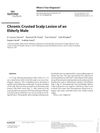 February 2014 in “Medicine - Programa De Formación Médica Continuada Acreditado”
February 2014 in “Medicine - Programa De Formación Médica Continuada Acreditado” The document concludes that non-scarring alopecias can be reversed, but scarring alopecias cause permanent hair loss.
 February 2013 in “Archives of Disease in Childhood: Education & Practice”
February 2013 in “Archives of Disease in Childhood: Education & Practice” Different types of alopecia in children require specific diagnoses and treatments.
 67 citations,
September 2003 in “Journal of cutaneous pathology”
67 citations,
September 2003 in “Journal of cutaneous pathology” Skin problems are very common in people with end-stage kidney disease.
 4 citations,
January 2015 in “Türk Patoloji Dergisi”
4 citations,
January 2015 in “Türk Patoloji Dergisi” Hormone imbalances from endocrine diseases can cause various skin conditions that help diagnose and treat these diseases early.
 3 citations,
February 2016 in “Pediatric dermatology”
3 citations,
February 2016 in “Pediatric dermatology” Strong skin creams work well for long-term scalp inflammation in Rapp-Hodgkin Ectodermal Dysplasia.
 2 citations,
December 2017 in “Skin appendage disorders”
2 citations,
December 2017 in “Skin appendage disorders” An elderly man's non-healing scalp lesion was successfully treated with a strong topical steroid.
 September 2023 in “Cureus”
September 2023 in “Cureus” Nails can reveal important health information about skin and body conditions.
 September 2016 in “Elsevier eBooks”
September 2016 in “Elsevier eBooks” Different types of hair loss in dogs and cats have various causes and treatments, with outcomes ranging from good to uncertain.
 11 citations,
May 2021 in “Clinical Epidemiology”
11 citations,
May 2021 in “Clinical Epidemiology” Vitiligo is underreported in medical claims and is linked to certain skin types and autoimmune diseases.
 12 citations,
November 1996 in “Australasian journal of dermatology”
12 citations,
November 1996 in “Australasian journal of dermatology” A kidney transplant patient on cyclosporin experienced unexpected severe hair loss, which improved with treatment adjustments.
 9 citations,
December 2017 in “The Journal of Allergy and Clinical Immunology”
9 citations,
December 2017 in “The Journal of Allergy and Clinical Immunology” New targeted therapies for hair loss from alopecia areata show promise, with personalized treatment expected in the future.

Lupus is a complex disease that requires personalized treatment because it varies greatly between individuals.
 42 citations,
April 2021 in “Journal of clinical pharmacology”
42 citations,
April 2021 in “Journal of clinical pharmacology” Baricitinib helps treat several diseases, including COVID-19, but has side effects and needs careful monitoring.
 33 citations,
November 2006 in “Survey of Ophthalmology”
33 citations,
November 2006 in “Survey of Ophthalmology” Madarosis is the loss of eyelashes and eyebrows due to various health issues and requires thorough examination to diagnose and treat the underlying cause.
 11 citations,
June 2022 in “Frontiers in immunology”
11 citations,
June 2022 in “Frontiers in immunology” New protein changes may be involved in the immune attack on hair follicles in alopecia areata.
 9 citations,
June 2003 in “Veterinary dermatology”
9 citations,
June 2003 in “Veterinary dermatology” Boxer dogs may have a genetic skin condition that worsens seasonally and can be treated with certain medications.
 59 citations,
June 2022 in “Frontiers in medicine”
59 citations,
June 2022 in “Frontiers in medicine” There are still challenges in diagnosing and treating chronic skin diseases, but there is hope for future improvements.
 24 citations,
January 2015 in “Current problems in dermatology”
24 citations,
January 2015 in “Current problems in dermatology” The document concludes that accurate diagnosis of hair loss in children is crucial due to limited treatment options and the condition's psychological impact.
 24 citations,
October 2014 in “Cold Spring Harbor Perspectives in Medicine”
24 citations,
October 2014 in “Cold Spring Harbor Perspectives in Medicine” Genetic research has advanced our understanding of skin diseases, but complex conditions require an integrative approach for deeper insight.
 24 citations,
June 2011 in “International Journal of Dermatology”
24 citations,
June 2011 in “International Journal of Dermatology” Most pregnant women experience skin changes like darkening and itching, while serious skin conditions are rare but need early treatment.
 15 citations,
September 1984 in “Veterinary Clinics of North America: Small Animal Practice”
15 citations,
September 1984 in “Veterinary Clinics of North America: Small Animal Practice” The document explains various skin conditions in cats and how to diagnose and treat them.
 8 citations,
January 2020 in “Plastic and Aesthetic Nursing”
8 citations,
January 2020 in “Plastic and Aesthetic Nursing” The article concludes that different types of hair loss require specific treatments and psychological support is important.
 7 citations,
December 2008 in “Expert Review of Dermatology”
7 citations,
December 2008 in “Expert Review of Dermatology” The document concludes that various childhood hair and nail disorders exist, some may improve on their own, and advances in genetics and immunology could enhance treatment and counseling.
 6 citations,
September 2013 in “The Obstetrician & Gynaecologist”
6 citations,
September 2013 in “The Obstetrician & Gynaecologist” Pregnancy can cause unique skin issues, some of which may risk the mother and baby's health and need careful treatment.
 2 citations,
December 2011 in “Annales de Dermatologie et de Vénéréologie”
2 citations,
December 2011 in “Annales de Dermatologie et de Vénéréologie” 2011 dermatological research found new skin aging markers, hair loss causes, skin defense mechanisms, and potential for new treatments.
 August 2018 in “Journal of The American Academy of Dermatology”
August 2018 in “Journal of The American Academy of Dermatology” A 54-year-old man with painful skin blisters and fever was diagnosed with Sweet syndrome and successfully treated with corticosteroids.
 January 2009 in “Springer eBooks”
January 2009 in “Springer eBooks” The document concludes that managing skin conditions during pregnancy is important and requires specialized care.
 18 citations,
December 1996 in “Seminars in Cutaneous Medicine and Surgery”
18 citations,
December 1996 in “Seminars in Cutaneous Medicine and Surgery” Chemotherapy and cytokine therapy can cause various skin reactions, including hair loss and hypersensitivity.
 October 2015 in “Elsevier eBooks”
October 2015 in “Elsevier eBooks” Aldesleukin can treat certain cancers and increase HIV patient CD4+ counts but often causes severe side effects.
 July 2022 in “Dermatology Reports”
July 2022 in “Dermatology Reports” Low zinc levels might be linked to worse outcomes in various skin disorders.






























